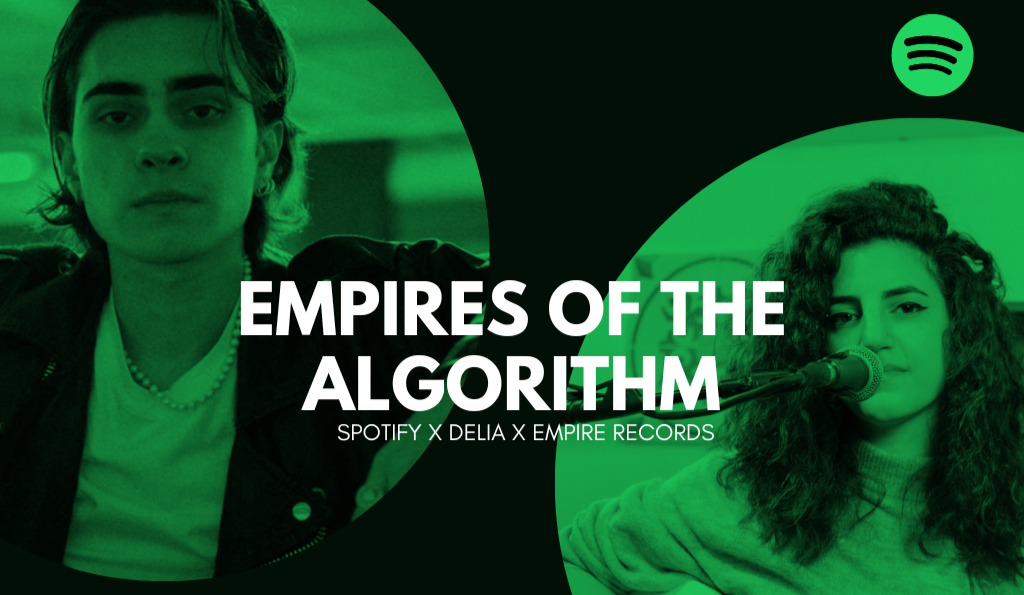We have written before about Palestinian pop music’s slow rise, as it attempts to break the shackles of the Spotify algorithm and inform a global audience about the talent that is exploding in the Middle East.
Just as battles for land and identity continue to be waged in Palestine, so too are artists of the Diasporic Arab community fighting for space on playlists to give their music a chance to be heard.
The algorithm is an anonymous, unaccountable behemoth that can make or break a musician’s career. Land up on the right playlist – ‘Palestine Sounds’, or ‘Music to drown out the sound of an air raid siren’ (not an actual playlist) – and you have a shot at being heard by a wider audience than you might ordinarily be exposed to.
In Palestine, where freedom of movement is restricted, and opportunities to congregate and perform in front of a live audience are few and far between, this is a big deal.
The Delia Arts Foundation supports Palestinian artists by providing physical spaces to practice and record their music, as well as music training courses, live events, and exposure. For what good is having talent, and then putting in the hard work to refine it, if you aren’t then exposed to an audience?
Delia was able to put two Arab musicians (Haya Zaatry and Maro) together to share their tribulations and triumphs on Spotify Live. The intention was to offer an insight to a global audience on what it means to be an Arab musician in the global music industry – and how easy it is to build your own empires of the algorithm.
The first artist is Haya Zaatry and you can watch her video on the Delia Sessions here. Rahawan is her latest album from 2022, available on Spotify, and the album name comes from her great great grandmother who came from Damascus and moved to Palestine.
Songs include ‘Ishtar’ (the goddess of love), which builds on the history of the region – perhaps suggesting that Ishtar was freer than folklore suggests. Haya’s Palestinian heritage is abundantly clear, as she sings in Palestinian dialect and interweaves stories about the struggle for Palestinians to move freely with songs of love that go beyond borders.
You can read more about her insights into two of her songs here.
The second artist is 21-year-old singer-songwriter Maro, who grew up predominantly in Lebanon. His father is Lebanese, and his mother is Ukrainian, and he cites his father’s Middle Eastern music with Arab lyrics, combined with his mother’s Slavic words and lush melodies for his early interest in music.
Maro was fortunate enough to go to music school as a young child and music helped him cope with the war, conflict, and loss that peppered his childhood. The song ‘Hellstorm’ is a composition rooted in trauma, about an explosion in Beirut and the loss of his grandmother which happened less than a month apart.
Maro’s musical success speaks to the democracy and virality of the YouTube generation. Similar to Justin Bieber, who found fame strumming his guitar on YouTube as a child, Maro was savvy enough to perform covers of popular artists on YouTube.
“It was just me right in front of the camera. It made people feel like I was closer to them and more authentic”, says Maro of his musical beginnings. That authenticity resonated, and his covers were soon being streamed with increasing regularity.
This afforded him the chance to work with producer Carl Fark, who has recorded with industry giants such as Madonna, Avicii, and Ariane Grande.
More importantly, it’s allowed him to pivot from covers to recording original compositions and writing about his life. As he puts it, “My songs are my songs, and they tell a story. They mean something to me because I’ve lived it.”
Maro is now based in Norway, anxiously following developments in his mother’s home country, Ukraine. Haya is in Palestine, working as an architect while also promoting the Palestinian live underground music scene.
Both artists no doubt appreciate the magnitude of their achievements in terms of getting their music heard on streaming platforms such as Spotify. They stand as beacons of hope to other aspiring musicians from the Middle East who are searching for ways and means to be heard.
Perhaps you need to walk the streets of Beirut or Gaza to fully appreciate the struggles of daily life. With intermittent internet and the ever-looming threat of war, it’s not easy to make music and follow your creative passions. For most, responsibility begins and ends with food, clothing, housing, and education.
By allowing two Arab musicians from different backgrounds to chat about their similarities, Spotify Live was able to provide a platform for its everyday listeners to appreciate this struggle. This informs a global audience about what is actually happening in the world that is around us through the songs that we listen to.
Delia Arts Foundation would like to thank Rawan Abou Joub from Spotify and Suhel Naffar from Empire for their help in coordinating the event.
Credits: https://empi.re


